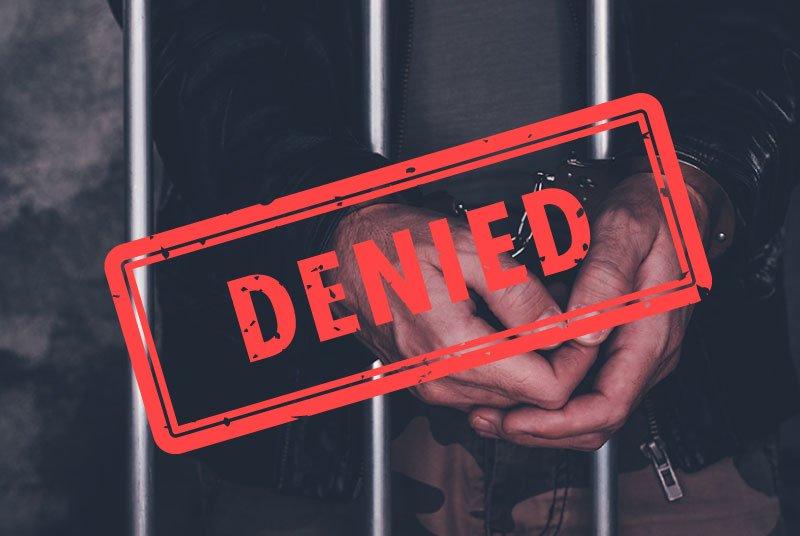The Person Who Denied the Validity of Continuing Bonds Was
- Details
- Written by Chris Ramos
When a person has been arrested one of the first things they'll want to do is contact a bondsman and arrange bail. If the crime they were arrested for was something like disorderly conduct they'll likely be informed of the bail for their particular offence once they've been charged. If they were arrested on suspicion of a more serious crime they'll probably need to wait a day or two until they have a bail hearing before a judge. While most jurisdictions have recommended bail amounts in place judges are given quite a bit of leeway when it comes to setting or even denying bail. The following are 8 of the most common reasons why a person may be denied bail.

- They are considered a flight risk - Bail is intended to ensure the accused (who is presumed innocent until proven guilty) shows up to court on the scheduled day to face the charges against them. A growing number of individuals, however, are using bail as a "get out of jail free" card and fleeing once they're released. If the judge considers a person a significant flight risk because, for instance, they have no roots in the community, he may deny bail.
- The crime is extraordinary in nature - If there is reason to believe the person before the judge has committed a brutal murder, rape, mass shooting or other heinous crime the judge may decide, for the good of the community, to hold him without bail pending further investigation. If no evidence emerges that points to the person's innocence they will very likely be held in custody until trial.
- They have a long criminal record - People are denied bail for any one of a number of reasons but having an extensive criminal record is definitely one of the most common. Judges become less sympathetic to defendants every time they see them and they will typically reach a point when they draw a line in the sand and deny bail. This is especially true if the crime the defendant is currently accused of happened while they were on probation or parole as a result of an earlier crime. Repeat offenders as a general rule stand a greater chance of being denied bail.
- They display contempt for the legal process - If a person shows up to a bail hearing and immediately launches into a verbal attack on the judge or otherwise displays contempt for the legal process they stand a good chance of being denied bail. The system only works if everyone respects it. If a person is going to display contempt for the system or its players they shouldn't be surprised if the system comes down on them.
- They are an undocumented alien - It's not uncommon for police to arrest people who turn out to be in the country illegally. When this happens there is very little chance the person will be released under any circumstances. In most states undocumented aliens who find themselves charged with serious crimes will wind up being reported to ICE (Immigration and Customs Enforcement). After the legal process relative to their alleged crime has run its course (including any time they may be sentenced to) they will likely be deported.
- They're deemed to be a threat to the community - People who have been arrested and charged with particularly grizzly crimes or who have a history of violent crime may be held without bail if the judge decides they represent a threat to the community. This type of action is typically reserved for the most violent offenders such as known rapists or accused serial killers.
- They have a history of jumping bail - It's not just the Jeffrey Dahmers of the world who are denied bail. If a person has a history of run-ins with the law and has demonstrated a propensity for jumping bail the court may decide enough is enough and refuse to grant them bail, even if the crime they're accused of is not particularly egregious. Bail, after all, is intended to allow a person to resume their normal life while awaiting their day in court. If someone demonstrates that they view the bail bonding process as little more than an opportunity to avoid being held accountable for their actions the judge may conclude there is no alternative but to remand them to custody until their trial starts.
- The person is mentally impaired - If a person comes before a judge and it seems they may be suffering from some sort of mental impairment the judge will often deny bail until the person has been evaluated by mental health professionals. They do this partly for the person's own sake but also for the sake of the people the defendant may come into contact with if they are released. There are countless forms of mental impairment and not all are obvious. But if the judge suspects something is off about the demeanor of the accused he will likely deny bail.
Talk to an Experienced Bail Bonds Agent
If you or someone you know has been denied bail in Adams County, Broomfield County, Weld County or anywhere in greater Denver, it's important to know why. If the person denied bail is a loved one find out the reason and then talk to the pros at Rapid Release Bail Bonds to learn more about your options going forward.
Source: https://rrbailbonds.com/blog/77-8-common-reasons-you-might-be-denied-bail
0 Response to "The Person Who Denied the Validity of Continuing Bonds Was"
Post a Comment